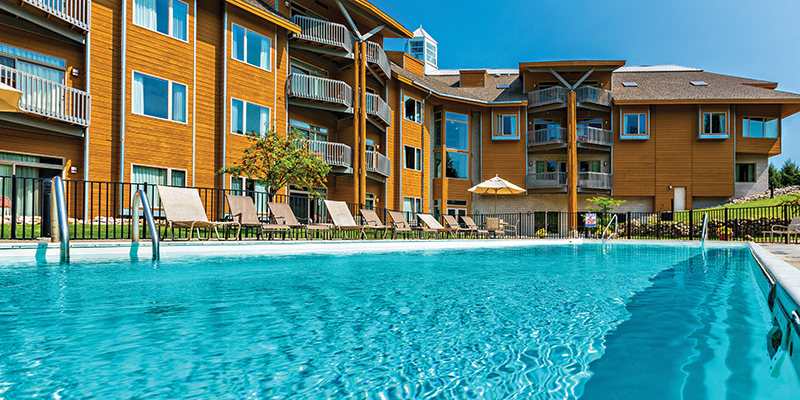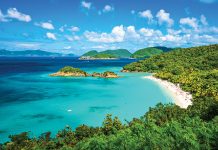
This was going to be the summer when Alex Dingrando would finally see his dream take sail. After years of working medicine’s front lines as a nurse at various metro Detroit hospitals, he was switching full time to his longtime side hustle as a watersports rental operator in northwestern Michigan.
“I always wanted to do this — open my own thing up here. So in early 2019, we kind of decided to make a move,” he says. Over the past year, he and his wife, Roxanne Dingrando, pieced together a business plan, scraped up some cash, put up a website, sold their Ferndale home, and moved to Traverse City.
“And then COVID hit,” Alex says.
The Dingrandos launched PlayNorth Watersports just as the coronavirus pandemic began to envelop Michigan, leaving people like them in a scenic purgatory: ready to pop open the state’s warm weather playground but nervously watching summer start to bleed away amid mandated shutdowns.
“When you have a seasonal business such as ours and you lose a day to weather or you lose a day to COVID-19 or you lose a month to COVID-19, you’re never going to get that back,” says Chris Shepler, president of Shepler’s Mackinac Island Ferry. “We lost May. We will never get May back, nor will we ever get a chance to regain that income.”
And no one has a clear answer to what is literally a billion-dollar question (Grand Traverse County alone counts on more than $1 billion in tourist-related spending each year, according to the Traverse City Tourism trade group): As restrictions are lifted, how many of us will be cool with grabbing some beach towels, packing up our cars, and hitting I-75 to go Up North?
Not as many as usual is the best guess. “The best case is that you might do 50 percent of your business, and the worst case is that you’ll be out of business,” says Jeffery Elsworth, a board member of the Michigan Restaurant & Lodging Association and an associate professor of hospitality business entrepreneurship at Michigan State University.
The loss of any guests is especially problematic when many mom-and-pop hoteliers, restaurateurs, and the like operate on seasonally dependent business plans. This stunted summer may dig holes from which some establishments can’t claw out, so the ability for tourists to hit their favorite spots in 2020 could have an outsized effect on whether those spots even exist in 2021.
“A lot of businesses in this area manage their money in a way that allows them to get through the slower periods of the year with the expectation that the summer is going to bring greater revenues and, thus, greater profits,” says Trevor Tkach, president and CEO of Traverse City Tourism. “You can make enough through the summer, even at 50 percent, … to stay open. But can you make enough to survive another full annual cycle, to make it through a whole other winter season?”
That has left some businesspeople at risk, including Martin Steinbis, who offers nine cabins for lease at Interlaken Resort & Burnt Island in the Upper Peninsula. “We don’t have deep pockets. We operate very much on a year-to-year basis and pinch pennies to get by,” he says.
Steinbis saw his spring fishing season fizzle, with few reservations: “I’m basically floating the resort at this stage on my savings. I continue to run a negative. That’s how I’m getting by.”
A cash crunch Up North can mean fewer jobs and resources for downstaters. Shepler’s was planning to hire just 50 seasonal employees this year instead of the usual 200 (many of whom would hail from around the state) and expected to open its passenger ferry schedule with just six daily runs instead of a more typical two dozen or so (with plans to ramp up if needed).
But the health emergency is spawning some economic creativity. Typically, Traverse City Whiskey Co. would pump out close to 800 gallons of spirits per week. This spring, it made as much as 10,000 gallons per week of hand sanitizer. The shift kept co-founder and distiller Chris Fredrickson from making decisions he didn’t want to make.
“Our bar staff was about to be laid off, and this hand sanitizer operation gave us the opportunity to transition [them] to hand sanitizer production and online order fulfillment, and they are still here in a full-time capacity,” Fredrickson says. “We will continue producing sanitizer until society tells us that there’s no longer a need. At that time, we’ll migrate back to whiskey.”
While in-person events were on hold Up North, Chateau Chantal Winery and Inn on Old Mission Peninsula whipped up virtual wine tastings and cooking classes and increased online sales to make up for lost room nights, wine dinners, and tasting room visits. At the same time, Chateau Chantal staff were figuring out how to restart in a socially distanced world and planning in-person wine tastings by online reservation.
“We’ll have the ability for people to preorder a flight of three wines,” says CEO Marie-Chantal Dalese. “So, rather than interfacing with someone for a half-hour, they’ll be able to just pick up a mini-wine tasting, go sit down at one of our really expansive outdoor patio areas, and then keep that social distancing … [and] just be able to feel comfortable and that they’re not in line or packed in.”
But, as with remote learning, there is concern that something meaningful will be lost in such coronavirus conversions. Chad Munger, president and founder of Traverse City’s Mammoth Distilling (which has also shifted to hand sanitizer production), had been looking at using single-use drinkware to guarantee cleanliness, but “drinking a nice cocktail out of a plastic glass is just not the same experience that you provided in the past. It’s not what people expect,” he says. “So I don’t know how they’ll tolerate it.”

Others are banking on the presumption that those of us heading north will zero in on attractions with social distancing built into the recreational model, such as golfing, hiking, biking, and camping.
“All of the things that effectively social distance people are here and are world-class,” says Peter Fitzsimons, executive director of the Petoskey Area Visitors Bureau.
Plus, there’s hope that such crowd-distanced activities may draw Detroiters who otherwise would head for packed places elsewhere, like mosh-pitted music festivals, busy urban hubs, and tight-seated jetliners.
“No question, the drive-to markets are more important to us this year than ever,” says Chris Hale, vice president of sales and marketing for Shanty Creek Resort in Bellaire. “We believe folks won’t be choosing to get on planes or going to major metro areas. There is opportunity there.”
As politically divisive as pandemic shutdowns have been, there’s certainly anecdotal evidence of a sizeable cohort that is and has been ready to motor Up North with cash in hand, virus be damned.
“We’ve seen and heard from people who are running the whole gamut, from canceling and ‘I’ll see you when there’s a vaccine’ to, ‘Oh, aren’t you open for Mother’s Day for wine tasting?’” Chateau Chantal’s Dalese says with a laugh. “There is this wide swath of ideas and perceptions that the public has.”
As for the Dingrandos, they’ll be carefully disinfecting their boats and Jet Skis, and waiting for people to show up. They’re still hopeful that their sun-splashed sanctuary will tempt enough families to safely salvage their summer traditions, and Alex’s dream.
“The nature is still here. The sunsets, the beach — it’s all still here,” Roxanne Dingrando says. “It’s a total reset, and everybody could use a total reset right now.”
|
|
|












